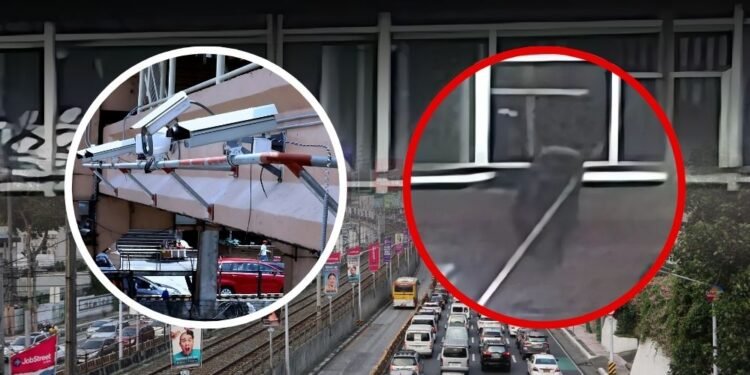The Metropolitan Manila Development Authority (MMDA) discovered that the cables of eight closed-circuit television (CCTV) cameras, integral to the No Contact Apprehension Policy (NCAP) along Epifanio de los Santos Avenue (EDSA) in Guadalupe, Makati City, had been deliberately severed and stolen.
This incident, detected during a routine system check when the cameras malfunctioned, represents a significant setback for Metro Manila’s traffic enforcement and public safety initiatives.
The NCAP, designed to monitor and enforce traffic regulations using advanced camera systems, relies on these cables to transmit data, enabling the identification and penalization of traffic violators without direct human intervention.
The stolen cables, made of fiber optics rather than copper, are not easily repurposed for resale in scrap markets, yet their high replacement cost makes them a target for theft.
The MMDA has clarified that this act appears motivated by the potential resale value of the cables rather than an expression of dissent against the NCAP system.
This incident underscores a broader challenge in urban infrastructure management: balancing technological advancements with the security of critical components.
The affected cameras, part of a network of 162 along EDSA and 21 specifically monitoring the EDSA Bus Carousel, are essential for reducing traffic violations and enhancing road safety.
Data from the MMDA indicates that NCAP implementation has led to an 18% reduction in accidents along EDSA and a 30% decrease on Commonwealth Avenue, highlighting the system’s tangible impact.
In response to the theft, the MMDA has taken proactive measures. The agency reported the incident to the Philippine National Police for investigation, aiming to identify and apprehend the culprits.
To deter future thefts, the MMDA is exploring the installation of protective covers over camera cables and has deployed personnel to inspect NCAP-related infrastructure as far as Magallanes.
Additionally, the agency has posted signage clarifying that the cables are fiber optic, not copper, to discourage theft driven by misconceptions about their value.
These steps reflect a commitment to maintaining the integrity of the NCAP system, which not only aids traffic enforcement but also supports the Philippine National Police in improving response times to criminal activities through real-time monitoring.
The theft raises broader questions about the vulnerability of urban surveillance systems. As cities increasingly rely on technology to manage public spaces, ensuring the physical security of such infrastructure becomes paramount.
The MMDA’s collaboration with the Land Transportation Office to develop real-time violation notifications via email and SMS further illustrates the agency’s push toward integrating technology into traffic management.
However, incidents like this highlight the need for robust safeguards, such as reinforced cabling or enhanced monitoring of critical sites, to prevent disruptions.
This incident also prompts a reflection on urban governance and community responsibility. While the NCAP has proven effective in reducing accidents, its success depends on public cooperation and the protection of its infrastructure.
The MMDA’s ongoing efforts to adapt and fortify the system demonstrate a commitment to resilience, but sustained progress will require addressing both the technical and social dimensions of urban safety.
As Metro Manila continues to grapple with congestion and road safety challenges, the protection of vital systems like NCAP remains a critical priority for ensuring safer streets for all.












